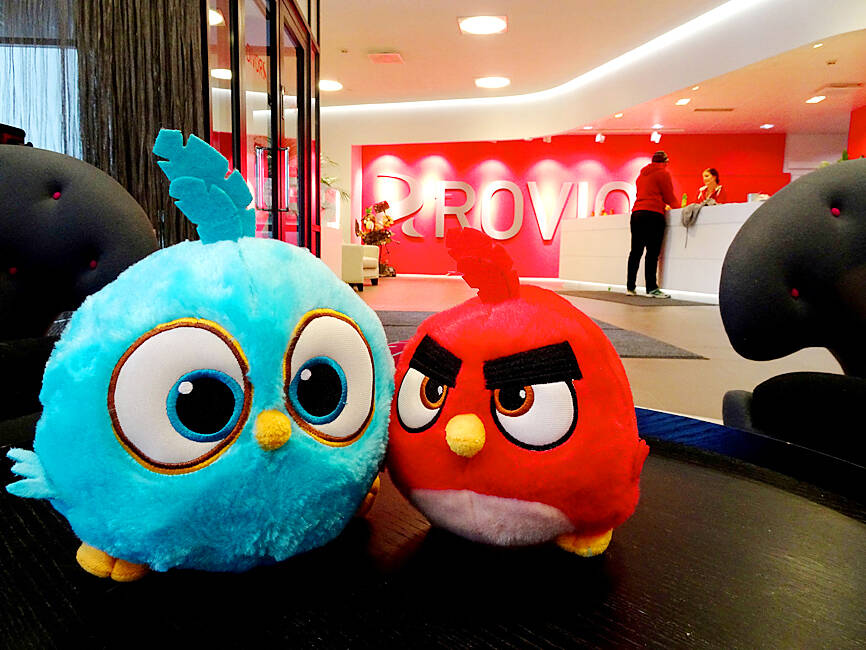Video game maker Sega Sammy Holdings Inc offered to buy Rovio Entertainment Oyj in a deal that values the Finland-based Angry Birds creator at about 706 million euros (US$776.34 million).
Sega offered 9.25 euros per share in cash to the shareholders and 1.48 euros per option to the option holders of Rovio, it said in a statement yesterday.
The Finnish company’s board unanimously recommended shareholders accept the offer that is backed by 49 percent of shareholders, including Rovio’s founding Hed family.

Photo: Reuters
The deal brings to close talks the Finnish mobile game maker had engaged in with multiple parties since an US$810 million offer from Israel-based Playtika Holding Corp became public in January.
Rovio on March 22 said that it had ended talks with Playtika, but continued discussions with other parties it did not identify.
Japan’s Sega is doubling down on console and smartphone gaming for long-term growth as its traditional businesses of pachinko and arcade machines face dwindling audiences and have been in hit by waves of COVID-19 restrictions in the past few years. Some of its best known titles include the Sonic the Hedgehog series, Crazy Taxi and the Yakuza series, also published as Like a Dragon.
“Among the rapidly growing global gaming market, the mobile gaming market has especially high potential, and it has been Sega’s long-term goal to accelerate its expansion in this field,” Sega chief executive officer Haruki Satomi said in the statement.
For Rovio, the famous Angry Birds franchise is the cornerstone of the Finnish company’s operations. First released in app stores in 2009, the branded mobile games generate more than 80 percent of its gross bookings. It was the first mobile game to reach 1 billion downloads, and Rovio went public in 2017 on the back of its success, with a market value of about 900 million euros.
The company’s first months on the stock exchange were characterized by dramatic slumps after its financial disclosures disappointed shareholders. The shares have never fully recouped the losses.
In its early years, the Finnish firm developed more than 50 games, typically with gloomy titles such as Darkest Fear, Cyber Blood and Wolf Moon, before striking gold with Angry Birds, an entertaining creation that capitalized on the iPhone’s touchscreen technology, new at the time.
Rovio’s reliance on the Angry Birds has worried investors, and the company has sought to expand to other brands and types of games. It has “several” new games in development and has acquired smaller rivals and games studios to grow in “hypercasual” and puzzle games.
The company calls the Angry Birds brand its “most precious asset,” bringing it discoverability in the crowded gaming market, and even generates a small slice of its revenue from licensing. Recent projects include a Netflix Inc show that followed two movies since 2016, and Rovio also generates royalties from consumer products.

Intel Corp chief executive officer Lip-Bu Tan (陳立武) is expected to meet with Taiwanese suppliers next month in conjunction with the opening of the Computex Taipei trade show, supply chain sources said on Monday. The visit, the first for Tan to Taiwan since assuming his new post last month, would be aimed at enhancing Intel’s ties with suppliers in Taiwan as he attempts to help turn around the struggling US chipmaker, the sources said. Tan is to hold a banquet to celebrate Intel’s 40-year presence in Taiwan before Computex opens on May 20 and invite dozens of Taiwanese suppliers to exchange views

Application-specific integrated circuit designer Faraday Technology Corp (智原) yesterday said that although revenue this quarter would decline 30 percent from last quarter, it retained its full-year forecast of revenue growth of 100 percent. The company attributed the quarterly drop to a slowdown in customers’ production of chips using Faraday’s advanced packaging technology. The company is still confident about its revenue growth this year, given its strong “design-win” — or the projects it won to help customers design their chips, Faraday president Steve Wang (王國雍) told an online earnings conference. “The design-win this year is better than we expected. We believe we will win

Chizuko Kimura has become the first female sushi chef in the world to win a Michelin star, fulfilling a promise she made to her dying husband to continue his legacy. The 54-year-old Japanese chef regained the Michelin star her late husband, Shunei Kimura, won three years ago for their Sushi Shunei restaurant in Paris. For Shunei Kimura, the star was a dream come true. However, the joy was short-lived. He died from cancer just three months later in June 2022. He was 65. The following year, the restaurant in the heart of Montmartre lost its star rating. Chizuko Kimura insisted that the new star is still down

While China’s leaders use their economic and political might to fight US President Donald Trump’s trade war “to the end,” its army of social media soldiers are embarking on a more humorous campaign online. Trump’s tariff blitz has seen Washington and Beijing impose eye-watering duties on imports from the other, fanning a standoff between the economic superpowers that has sparked global recession fears and sent markets into a tailspin. Trump says his policy is a response to years of being “ripped off” by other countries and aims to bring manufacturing to the US, forcing companies to employ US workers. However, China’s online warriors